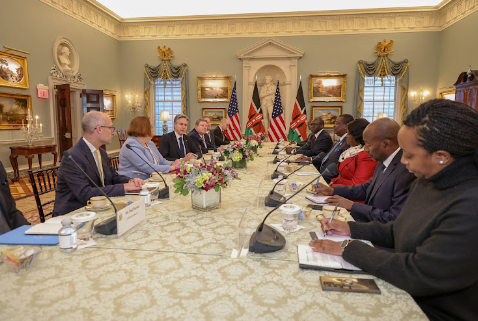The U.S. continues to express concerns regarding Kenya’s efforts to combat corruption, regulatory issues in agriculture and customs, and the transparency of procurement processes as the two countries approach the final stages of a trade agreement. Insiders familiar with the negotiations told the Star that American officials have been particularly critical of Kenya’s handling of corruption and procurement matters, which remain key points of discussion.
In addition to these issues, topics such as trade facilitation and enforcement, environmental standards, good regulatory practices, inclusivity, and workers’ rights are also on the agenda. The U.S. is advocating for transparent and competitive procurement practices within the Kenyan government, as well as robust protection for intellectual property rights and favorable sanitary and phytosanitary measures.
The goal is to secure business opportunities for U.S. companies and achieve comprehensive market access for agricultural products in Kenya by reducing or eliminating tariffs. The United States has proposed a draft text on anti-corruption that includes nine articles addressing a wide array of topics, featuring high standards to prevent and combat bribery and other corrupt practices. This text reflects the priorities and initiatives of the U.S. in these negotiations.
“The text recognises the importance of preventing and combating bribery and corruption in the context of labour law implementation and enforcement, and provides for strong obligations to fight corruption related to abusive practices in the recruitment of migrant workers,” the US Trade Representative notes in a summary report.
To enhance efforts in combating environmental degradation, the proposed text emphasizes the need to prevent and address bribery and corruption as part of strengthening environmental governance and enforcement.
Key provisions include obligations to establish criminal offenses for the bribery of public officials, embezzlement, and money laundering.
The text also mandates the maintenance of records to prevent the concealment of corruption, prohibits the tax deductibility of bribes, requires measures for the seizure of assets gained through corruption, and allows for the denial of entry to foreign public officials involved in corrupt activities.
Additionally, it calls for the establishment of procedures to report corruption and protect whistle-blowers, including safeguarding external auditors.
Kenya is currently ranked 126th out of 180 countries in Transparency International’s 2023 Corruption Perceptions Index, where the top-ranked country is perceived to have the most honest public sector.
Regarding agriculture, the U.S. aims to enhance transparency and regulatory certainty for agricultural exporters and importers, seeking to expand the market for American farmers.
It encourages U.S.-Kenyan cooperation to foster innovation, promote fair trade, and adopt tailored approaches to advance sustainability goals, particularly for small producers.
The proposed text includes provisions for technical consultations between the parties to collaboratively address issues arising from agricultural agreements, along with annexes covering terms for meat, cheese, distilled spirits, and wine.
The Strategic Trade and Investment Partnership (STIP) negotiations recently entered their seventh round, with the next round expected to take place in September, as noted by Trade CS Salim Mvurya.
“We cannot share key positions taken because we are still discussing,” said Mvurya.
President William Ruto and U.S. President Joe Biden have been urging their teams to finalize a trade deal before the upcoming U.S. elections in November. The two countries initially aimed to reach an agreement by December of last year, but negotiations have continued into this year.
Through a bilateral deal, Kenya hopes to capture at least five percent of the U.S. market, potentially generating over Sh2 trillion in annual export revenues for the country.
According to the Economic Survey 2024, Kenya’s exports to the U.S. were valued at Sh62.3 billion last year, a decline from Sh79.9 billion in the previous year.
More than half of Kenya’s exports to the U.S. consist of textiles and apparel, macadamia nuts, coffee, titanium ores and concentrates, and black tea. However, trade currently favors the U.S., as Kenya’s imports from the U.S. increased to Sh112.8 billion, up from Sh93.4 billion in 2022.



